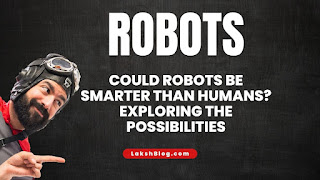Could Robots Be Smarter Than Humans? Exploring the Possibilities
Robots and artificial intelligence (AI) have made
significant advancements in recent years, raising the question of whether they
could surpass human intelligence in the future. While it is a complex and
controversial topic, there are several factors to consider when discussing the
potential intelligence of robots.
The Nature of Intelligence
To understand whether robots could be smarter than humans, it
is essential to define intelligence. Human intelligence encompasses a wide
range of cognitive abilities, including reasoning, problem-solving, creativity,
and emotional intelligence. These capabilities are a result of our complex
neural networks and the interaction between various regions of the brain.
Advancements in Artificial Intelligence
Artificial intelligence has progressed rapidly in recent
decades, allowing machines to perform tasks that were once thought to be
exclusively within the realm of human intelligence. Machine learning algorithms
and neural networks have enabled AI systems to process vast amounts of data,
recognize patterns, and make predictions with impressive accuracy.
Processing Power and Speed
One advantage robots have over humans is their ability to
process information at incredible speeds. Machines can perform calculations and
analyze data much faster than the human brain. This computational power allows
robots to analyze complex problems and generate solutions efficiently.
Memory and Access to Information
Robots can store and retrieve vast amounts of information,
providing them with a comprehensive knowledge base. Unlike humans, who rely on
memory recall and external references, robots can access and analyze data
instantaneously, giving them an advantage in tasks that require extensive
knowledge.
Limitations of Robots
While robots excel in specific areas, they still have
limitations compared to human intelligence. Human cognition is incredibly
versatile, allowing us to adapt to new situations, apply knowledge creatively,
and possess a deep understanding of abstract concepts. Our emotional
intelligence and social skills are essential for effective communication and
interaction, areas where robots still struggle to replicate human capabilities.
The Role of Consciousness and Experience
Consciousness, subjective experience, and self-awareness are
integral aspects of human intelligence. While robots can mimic certain human
behaviors, they lack true consciousness and subjective experiences. These
qualities play a significant role in human intelligence and contribute to our ability
to think critically, reflect, and make moral judgments.
Ethical Considerations
The question of robots surpassing human intelligence raises
ethical considerations. If robots were to become smarter than humans, issues
related to power dynamics, control, and the potential impact on human society
would arise. Ensuring the responsible development and use of AI systems would
be crucial in navigating these ethical challenges.
Conclusion
While robots and AI have made remarkable progress in
specific domains, the question of whether they could be smarter than humans
remains complex. Robots can outperform humans in specific tasks that require
processing power, speed, and access to information. However, human intelligence
encompasses a broader range of cognitive abilities, including creativity,
emotional intelligence, and consciousness. While the future development of AI
is uncertain, it is essential to approach it with careful consideration,
addressing ethical concerns and ensuring the responsible integration of AI
technology into society.
